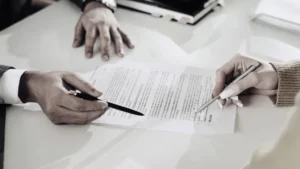
When a loved one passes away, families are often faced with important decisions — and a great deal of paperwork. From medical certificates to death registrations, every step must be completed accurately to ensure a smooth and respectful process. At Black Tulip Funerals, we manage all cremation legal requirements on your behalf, allowing you to focus on what truly matters — remembering, healing, and honouring your loved one.
Understanding the Legal Process for Direct Cremation
In New South Wales, direct cremation involves specific legal documentation that must be completed before a cremation can take place. These include the Medical Certificate Cause of Death (MCCD), the Cremation Risk Advice, and the Death Registration Form. Our experienced team ensures that each document is properly handled, submitted, and verified, helping families avoid delays or confusion.
Obtaining the Death Certificate
One of the most important legal documents following a passing is the official Death Certificate, issued by NSW Births, Deaths & Marriages (BDM).
At Black Tulip Funerals, we guide you through every step:
-
We provide the NSW Death Registration form for you to complete.
-
Once returned, we forward it to Births, Deaths & Marriages together with the Medical Certificate Cause of Death provided by the attending doctor.
-
BDM registers the death the day after the cremation has taken place.
-
The official Death Certificate is typically mailed to you within 2–3 weeks by registered post.
-
If preferred, the applicant may collect it in person from either Pyrmont or Parramatta offices.
Our team monitors the process closely, ensuring there are no administrative hurdles along the way.
When a Death Occurs at Home
If a loved one passes away at a private residence, a Medical Certificate Cause of Death is generally signed by the family’s regular GP — provided they have attended the patient within the last six months and seen them in the last three weeks.
We recommend, especially for families choosing cremation, that the attending doctor is your usual GP. This avoids the need for an additional transfer or second visit for certification, saving both time and unnecessary costs.
In some circumstances, the Police and Coroner may need to be involved, particularly in the case of accidental, unexplained, or unexpected deaths. The Coroner acts to determine the cause of death, and an autopsy may be required. Throughout this process, our staff remain available on 1300 11 0031 to assist and advise.
When a Death Occurs in a Nursing Home
For deaths occurring in a nursing home, the normal GP usually issues the Medical Certificate Cause of Death. However, in some cases, nursing homes request immediate transfers and have an after-hours GP or nurse sign an interim certificate.
While this may suffice for burial, cremation requires more specific documentation. The normal GP may request to view the body again before issuing the Attending Practitioner’s Cremation Certificate, as per NSW regulations.
To simplify this, families can request the Cremation Risk Advice form — a document that replaces the need for GP attendance in some situations. Black Tulip Funerals can provide this form directly and liaise with your GP to ensure compliance.
Please note: Some GPs charge between $110 and $295 for issuing the required forms, as this is not covered under Medicare. If this fee is paid by the family, we are happy to deduct or refund it from the funeral cost.
When a Death Occurs in a Hospital
When a person passes in a public or private hospital, the hospital doctor usually signs the Medical Certificate Cause of Death. Once the death has been verified, the family may contact a funeral director of their choice for transfer.
In NSW, hospital transfers now require written permission from the next of kin. Black Tulip Funerals ensures this consent is documented and all protocols are followed before the deceased is moved into our care.
Cremation Risk Advice: What Families Should Know
The Cremation Risk Advice form ensures that cremation can proceed safely, confirming that no medical devices or substances could pose risks during the process. While this document is typically free when issued by hospitals or the NSW Coroner, private doctors may charge a small fee.
Our team manages this requirement as part of our complete direct cremation service, ensuring that nothing is overlooked or delayed.
Making It Easier for Families
Navigating cremation paperwork can be overwhelming, especially during a time of grief. That’s why Black Tulip Funerals takes care of every form, certificate, and submission for you. From registering the death to organising the cremation authorisations, we make sure the process is handled efficiently, respectfully, and without unnecessary stress.
When you choose direct cremation, we ensure compliance with all cremation legal requirements in New South Wales — so you can focus on healing and cherishing memories, knowing that everything has been managed with professionalism and care.


